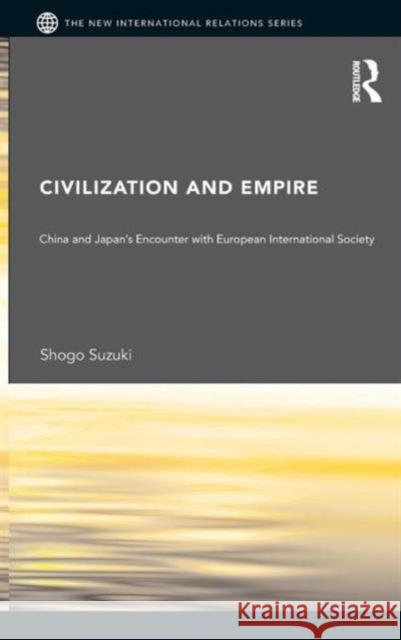Civilization and Empire: China and Japan's Encounter with European International Society » książka
Civilization and Empire: China and Japan's Encounter with European International Society
ISBN-13: 9780415446884 / Angielski / Twarda / 2009 / 272 str.
Civilization and Empire: China and Japan's Encounter with European International Society
ISBN-13: 9780415446884 / Angielski / Twarda / 2009 / 272 str.
(netto: 673,60 VAT: 5%)
Najniższa cena z 30 dni: 700,05
ok. 22 dni roboczych.
Darmowa dostawa!
This book critically examines the influence of International Society on East Asia, and how its attempts to introduce 'civilization' to 'barbarous' polities contributed to conflict between China and Japan. Challenging existing works that have presented the expansion of (European) International Society as a progressive, linear process, this book contends that imperialism - along with an ideology premised on 'civilising' 'barbarous' peoples - played a central role in its historic development. Considering how these elements of International Society affected China and Japan's entry into it, Shogo Suzuki contends that such states envisaged a Janus-faced International Society, which simultaneously aimed for cooperative relations among its 'civilized' members and for the introduction of 'civilization' towards non-European polities, often by coercive means. By examining the complex process by which China and Japan engaged with this dualism, this book highlights a darker side of China and Japan's socialization into International Society which previous studies have failed to acknowledge. Drawing on Chinese and Japanese primary sources seldom utilized in International Relations, this book makes a compelling case for revising our understandings of International Society and its expansion. This book will be of strong interest to students and researcher of international relations, international history, European studies and Asian Studies.
This book provides a critical examination of how state socialisation has been conceptualised by examining the entry of China and Japan in the expansion of the European international order. The author provides an account of the socialisation process and focuses on the domestic content which reinterprets normative influences and helps shape the outcomes of the socialisation process.
Challenging existing works which are characterised by a ‘thin’ conceptualisation of state socialisation which sees international social structures as shaping state identities and preferences, this book puts the focus back on the agents, and examines how domestic and international societies interacted. By examining how actors interpret and act upon international social pressures it demonstrates that domestic actors exercise agency in their socialisation, and the result is not necessarily a faithful replication of certain behavioural patterns. Rather, the outcomes of this process are divergent, and can have unintended consequences. In particular, this book sheds light on the ‘unintended consequences’, where China and Japan’s exposure to European International Society actually led to the first war between the two states in three hundred years, rather than reproduce the norms that were intended to facilitate a greater degree of order and coexistence among European states.
Drawing on Chinese and Japanese primary sources seldom utilised in International Relations, make a compelling case for revising our understandings of European International Society and its expansion. This book will be of strong interest to students and researcher of international relations, international history, European studies and Asian Studies.











